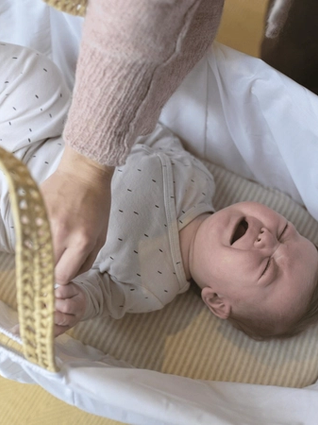
- Home
- Tools And Resources
- Baby Development Calendar
- 9–10 Weeks Old Baby | Development
9-10-weeks-old baby
2 min
Babies at this age…
- Will be starting to fill out - and have chubbier thighs!
- Are more drawn to faces than any other image
- Smile a lot
- Will turn to sounds and follow objects, especially if they're held about 8 inches in front of them
- Will be able to hold their head in line with their body when pulled up gently by the hands from a lying to a sitting position
- Are growing about 2.5 cm (1 inch) per month
- Are likely still waking in the night to feed. (Read our tips and advice for helping your baby get a good night’s sleep.)
Crying
By now, you will be getting more familiar with your baby’s different cries and whether they signify hunger, a dirty nappy, or a request to play or be cuddled. Many babies this age have a crying spell during some part of the day (for some reason, this often happens around teatime) - this is quite normal. You may need to rock or hold them, sing or put music on, or take your baby out for a walk or drive (or ask your partner to do it!). Sometimes, babies have growth spurts and are extra hungry for a day or two, which can also lead to some unsettled behaviour.
Unexplained, inconsolable periods of crying or screaming, which can happen at any time of the day or night, might be a sign of colic. Colic is a sort of stomach cramp that comes in waves; babies with colic may scream and pull their legs up to their bellies, and it's difficult to comfort them.
If you think your baby might have colic, keep a record of when your baby cries and for how long and discuss this with your doctor or health visitor. You can also contact a support organisation such as CRY-SIS – their counsellors will be able to offer advice and support on coping with a crying baby.
Getting together with other parents
Spending time with other parents who are in the thick of it, too, can be a real support. Whether it’s a baby class, a local group, or a chat in a WhatsApp or Facebook group, sharing the ups and downs of life with a little one can make things feel that bit easier.
You might meet people through your health visitor, at the baby clinic, or even just by striking up a conversation at the park or a café. However those connections happen, having someone who gets it can be a lifeline in the early weeks.
